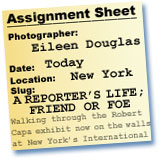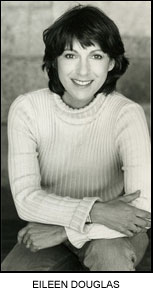A
REPORTER’S
LIFE
FRIEND OR FOE
By
Eileen Douglas
There
is a theory I have. A “human-side-of-the-news-business” theory.
About the exchanges we have with the people we cover. And what,
more deeply, that implies about who they are, and, ultimately,
how they do their jobs.
My thoughts are triggered by an article in the New York Times.
This piece, analyzing relations between the military and
the press, specifically coverage of the war
in Iraq, noted a shift in attitude by the top brass, all the way up to Secretary
of Defense Robert Gates, who recently made it a point to tell his military
officers, “The
press is not the enemy.” As the NY Times so rightly points out, this is
a view one would never had heard from Gates’ predecessor Donald Rumsfeld.
(It also translates into better press coverage.)
I have never covered a war or dealt much with the military, but I have observed
while covering many a cop, mayor, senator, councilman, high profile lawyer,
political candidate, police chief, fire captain, union leader, governor and
all manner
of other public figures what I believe are, broadly speaking, two kinds of
personalities. Two kinds of attitudes toward the press. Whether the reporter
is friend or foe.
First is the office holder, public servant or newsmaker who seems genuinely
glad to see you. Who wants to talk. Who actually likes you. Or is smart enough
to
seem to. Who’ll take your phone calls no matter when you ring up. Who,
if you meet him or her walking down the hall or on the street, will greet you
warmly. Who will welcome you into his or her office. Who will, should you turn
up at a crime scene, tell you openly what happened. Even offer up a further
lead, or volunteer a good tip you can use for another story. Whether they genuinely
like you or merely realize they need you, value you for your access to the
greater
public, the thinking is the same. They do not think the reporter is the enemy.
Conversely, there is the news figure whose attitude is at all times suspicious.
At a news event, they will give you as little as possible. Show up at their
office, they treat you as a pest. Find you talking to their staff, they give
you the
look that says “wish you weren’t around. Can’t you disappear?” They
start from a place of distrust. I’m not talking about a distrust caused
by some mistreatment by a member of the press. I’m talking about a pre-existing,
that’s their personality.
That same NY Times article contains a quote from General Peter Pace, made as
he was giving farewell remarks as chairman of the Joint Chiefs of Staff. In
his view, “In some instances right now we have individuals who are more interested
in making somebody else look bad than they are in finding the right solution.” He
meant the press. He was talking about the Iraq War. But what he was saying could
be the opinion of many another kind of newsmaker. He meant reporters have an
agenda. He means we start from a place that says “we’re out to
get you.”
You may or may not agree with me. I can’t speak for every reporter. Maybe
some reporters do wake up in the morning thinking “who can I get today.” But
I know the only agenda I ever have as a reporter is simply to get the story.
I’m not looking either to puff up or tear down. And I believe that is true
for the colleagues I’ve worked with. But what I write here I write, not
as reporter, but as a citizen.
So. To my theory.
These attitudes---of welcome or distrust---at their core reflect to me the
attitude a mayor, governor, fire chief, cop on the beat, you name it, has,
not just toward
the reporter, but toward the public he or she is in office to serve. And, whether
a cop or a senator, they are there to do the people’s business. But how
they regard the people they are there to serve is the question.
I think there is a direct connection between how a news figure welcomes or
dislikes reporters and how they approach doing the people’s business. The formula
at its simplest reads to me. Like the public. Like the press. Distrust the public.
Distrust the press. The first realizes he/she needs the interaction with the “folks” in
the public out there. Even if not genuine in their open welcome to a reporter
--- the chatting up after the news conference, the way they make their press
aide available as quickly as possible, the whispered tip at the precinct house
--- even if it is calculated, at least they are aware that it is through the
reporter that they get their message out, and getting their message out to the
people matters and is part of their process. They see their job as part of a
two-way conversation. They respect “the people.” The latter is, in
my opinion, coming from another place. A place that doesn’t want anyone
looking over his or her shoulder. That says don’t tell me what to do. Leave
me be so I can do my job as I see fit. And I’ll just let you know later
what I have done or decided.
I never thought of myself as the enemy. Personally, I don’t like being
treated as such. At the end of the day, as a reporter, I don’t see myself
as friend or foe. But, knowing first hand of the kind of back and forths, the
kind of human exchanges that take place every day in the relationship between
reporter and reported on, it seems to me the way a newsmaker treats the press
speaks volumes, and is, at heart, as much a reflection, for good or bad, not
on us, but on them.
Eileen
Douglas
Eileen Douglas is
a broadcast journalist-turned-independent documentary filmmaker.
Former 1010 WINS New York anchor/reporter and correspondent
for ABC TV's "Lifetime Magazine," she is the author of "Rachel
and the Upside Down Heart," and co-producer of the films "My
Grandfather's House" and "Luboml: My Heart Remembers." She
can be reached at http://www.douglas-steinman.com/

